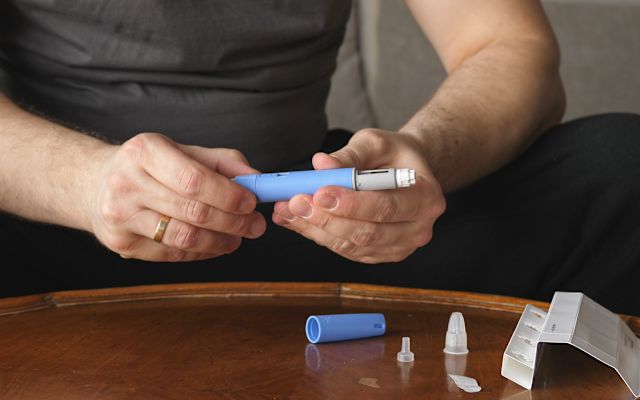Updated on January 13, 2026.
Unprecedented demand for weight-loss drugs, like Wegovy, Rybelsus, Ozempic, Mounjaro and Zepbound, shows no sign of slowing down. These blockbuster drugs belong to a class of medications known as glucagon-like peptide-1 (GLP-1) receptor agonists, or GLP-1s.
Between early 2020 and the end of 2023, prescription volumes for these drugs also increased by 300 percent. JPMorgan Research predicts the market for the drug will grow to more than $100 billion by 2030 with some 30 million users—about 9 percent of the U.S. population.
What is driving this surge in demand?
In the U.S., more than one-third of adults—and about 17 percent of children—are obese, according to the National Institutes of Health. Obesity puts these people at higher risk for a long list of chronic health issues including heart disease, high blood pressure, stroke, type 2 diabetes, osteoarthritis, sleep apnea, and certain types of cancer.
But there is no simple solution for the obesity epidemic, which dates back to the 1980s. Diet and exercise are just two factors involved in a complex public health issue. For example, social determinants of health—where people live and work as well as their access to healthy foods, healthcare, recreational spaces, education, and support systems—play a role. Lifestyle factors, like sleep loss, time spent sitting, mental health conditions, mobility issues, and genetics also contribute to myriad challenges people face in their ability to maintain a healthy weight.
GLP-1s are offering new hope for millions. Studies show these drugs are highly effective in helping people lose weight. In fact, one March 2021 study published in the New England Journal of Medicine found that patients on semaglutide—one of seven GLP-1s—lost an average of 15 percent of their body mass.
How GLP-1s work—and how they help people lose weight
Eating causes the gut to release a hormone called glucagon-like peptide 1 (GLP1), which triggers the release of insulin to help regulate blood sugar levels.
This so-called incretin effect is diminished in people with type 2 diabetes, which may contribute to reduced insulin production, insulin resistance, and high blood sugar. GLP-1 agonists mimic (GLP1), which helps explain why GLP-1s were originally developed to help manage type 2 diabetes.
But GLP1 also slows digestion, helps promote a feeling of fullness, and helps control appetite, making GLP-1s effective weight loss tools—when used in addition to lifestyle adjustments, such as regular exercise, adequate sleep, changes in behavior or thinking patterns and following a healthy eating plan.
In addition to regulating blood sugar and assisting weight loss, GLP-1s may also help:
- Lower blood pressure
- Improve cholesterol and fatty liver disease
- Reducing the risk of heart and kidney disease
- Delaying the progression of diabetes-related nerve damage
- Increase fertility in women and men
- Improve obstructive sleep apnea
GLP1-s approved by the U.S. Food and Drug Administration (FDA)
Semaglutide (once weekly injection or once-daily pill):
- Ozempic: This drug is approved to lower blood sugar levels in adults with type 2 diabetes. It is also approved to reduce the risk of heart attack, stroke, or death in adults with type 2 diabetes and known heart disease.
- Wegovy: This drug is approved for weight loss. It is intended to help adults and children aged 12 years and older with obesity (BMI) of 30 or higher) or some overweight adults (BMI of 27 or higher) who also have weight-related condition, such as high blood pressure, high cholesterol, or type 2 diabetes. In March 2024, the U.S. Food and Drug Administration (FDA) expanded Wegovy’s approved uses to include the prevention of cardiovascular death, heart attack, and stroke in adult patients with heart disease who are also overweight or obese. And in December 2025, the FDA approved oral Wegovy for weight loss as well as the prevention of life-threatening heart events. The once-daily pill available in early 2026 was shown to be safe and effective. A 64-week trial of 307 adults found those taking the pill while also reducing their caloric intake and exercising regularly achieved an average 17 percent weight loss compared to 2.7 percent among those who did not take the medicine.
Oral semaglutide (once daily tablet):
- Rybelsus: This drug is approved to lower blood sugar levels in adults with type 2 diabetes.
Liraglutide: (once daily injection)
- Victoza: This drug is approved for people with type 2 diabetes.
- Saxenda: This drug is specifically designed for weight loss in people with obesity (BMI) of 30 or higher) or some overweight adults (BMI of 27 or higher) who also have weight-related condition, such as high blood pressure, high cholesterol, or type 2 diabetes.
Dulaglutide (once weekly injection)
- Trulicity: This drug is approved for people with type 2 diabetes.
Exenatide extended release (once weekly injection)
- Bydureon BCise: This drug is used together with diet and exercise to improve blood sugar control in people with type 2 diabetes mellitus.
Exenatide (twice daily injection)
- Byetta: This drug is approved for people with type 2 diabetes.
Tirzepatide (once weekly injection) is a dual GIP/GLP-1 receptor agonist. It activates GLP-1 receptors—as well as another hormone involved in blood sugar control called glucose-dependent insulinotropic polypeptide (GIP). FDA-approved options include:
- Mounjaro: This drug is approved to treat adults with type 2 diabetes.
- Zepbound: This drug is approved for chronic weight management in adults who are overweight (BMI of 27 or greater) or obese (BMI of 30 or greater) with at least one weight-related condition, such as high blood pressure, type 2 diabetes, high cholesterol, or obstructive sleep apnea (OSA).
Is a GLP-1 right for you?
GLP-1s have been studied and are designed for weight loss in people with a BMI of 27 to 29.9 and at least one weight-related condition or those with a BMI of 30 or higher. The safety of using the drugs for more cosmetic weight loss—say shedding 10 to 15 pounds—isn’t clear.
GLP-1s are also not a quick-fix. Taking these drugs doesn’t absolve people from having to follow a healthier diet, be more active, and adopt healthier habits as well as other adjustments to support long-term weight management. In the absence of these lifestyle changes, people who stop taking these drugs often regain the weight they lost.
Another downside: cost. GLP-1s are expensive with a price tag ranging from $500 per month to as much as $1,500 per month. Even if you qualify for their use, the drugs are not covered by Medicare for obesity. But Medicare and most private insurers cover them for the treatment of type 2 diabetes. In March 2024, Medicare also announced it will cover Wegovy as a weight loss solution for Medicare Part D enrollees when it is prescribed to prevent heart attacks and strokes in obese patients.
All medications come with the possibility of certain side effects. The most commonly reported side effects of GLP-1s include nausea, diarrhea, dehydration, and headaches. Some people may develop an allergic reaction or hypoglycemia, or very low blood sugar. In rare cases, these drugs may be tied to an increased risk of pancreatitis (inflammation of the pancreas), bowel obstruction (a blockage in the bowel), and gastroparesis (slowed or stopped movement of food from the stomach to small intestine).
It’s important to talk to your healthcare provider (HCP) about what is safe and appropriate for you. This will enable you to weigh all the possible risks and benefits associated with weight-loss drugs and consider all treatment options that may be available.
Be aware of “fake” GLP-1s being sold online
Illegally marketed versions GLP-1s, including counterfeit Ozempic are being sold online. The FDA has issued warning letters to stop the distribution of these illegally marketed products, which may contain the wrong ingredients, harmful ingredients, or the incorrect amount of ingredients.
Some products sold as ‘semaglutide’ and compounded versions of the drugs (with combined, mixed, or altered ingredients) are not regulated by the FDA and consumers cannot be sure about what they are getting. Some may contain the salt forms, such as semaglutide sodium and semaglutide acetate. These are different active ingredients than what is used in the approved drugs, and they have not been shown to be safe or effective.







